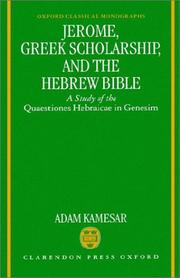| Listing 1 - 6 of 6 |
Sort by
|
Book
ISBN: 9780521678025 9780521860901 0521860903 0521678021 9781139002394 Year: 2009 Publisher: Cambridge Cambridge University Press
Abstract | Keywords | Export | Availability | Bookmark
 Loading...
Loading...Choose an application
- Reference Manager
- EndNote
- RefWorks (Direct export to RefWorks)
Philo of Alexandria --- Philo, --- 296*332 --- Philo van Alexandrië:--studies --- 296*332 Philo van Alexandrië:--studies --- Alexandria, --- Filon --- Filón, --- Filon, --- Filone, --- Philon, --- Philonis, --- Yedidyah, --- פילון --- פילון מאלכסנדריה --- פילון, --- פילון היהודי --- Филон Александрийский --- Filon Aleksandriĭskiĭ --- Pseudo-Philo

ISBN: 0198147279 9780198147275 Year: 1993 Publisher: Oxford Clarendon
Abstract | Keywords | Export | Availability | Bookmark
 Loading...
Loading...Choose an application
- Reference Manager
- EndNote
- RefWorks (Direct export to RefWorks)
Greek philology. --- 276 =71 HIERONYMUS, SOPHRONIUS EUSEBIUS --- Greek philology --- Classical philology --- Greek language --- Greek literature --- Latijnse patrologie--HIERONYMUS, SOPHRONIUS EUSEBIUS --- Jerome Saint --- -Knowledge --- -Greek philology --- Jerome, --- Gerolamo, --- Gérome, --- Gerónimo, --- Girolamo, --- Heronimos, --- Hieronim, --- Hieronymus, Eusebius, --- Hieronymus, --- Hieronymus, Sophronius Eusebius, --- Hieronymus, Stridonensis, --- Ieronim, Stridonskiĭ, --- Iheronimus, --- Jerónimo, --- Jerōnimos, --- Knowledge --- Bible. --- Versions --- Vulgate. --- Jeronimi,
Book
ISBN: 1139801368 1139002392 Year: 2009 Publisher: Cambridge : Cambridge University Press,
Abstract | Keywords | Export | Availability | Bookmark
 Loading...
Loading...Choose an application
- Reference Manager
- EndNote
- RefWorks (Direct export to RefWorks)
The works of Philo of Alexandria, a slightly older contemporary of Jesus and Paul, constitute an essential source for the study of Judaism and the rise of Christianity. They are also of extreme importance for understanding the Greek philosophy of the time and help to explain the onset of new forms of spirituality that would dominate the following centuries. This handbook presents an account of Philo's achievements. It contains a profile of his life and times, a systematic overview of his many writings, and survey chapters of the key features of his thought, as seen from the perspectives of Judaism and Greek philosophy. The volume concludes with a section devoted to Philo's influence and significance. Composed by an international team of experts, The Cambridge Companion to Philo gives readers a sense of the state of scholarship and provides depth of vision in key areas of Philonic studies.
Book
ISBN: 9781009234849 9781009234795 9781009234818 1009234803 1009234846 Year: 2023 Publisher: Cambridge : Cambridge University Press,
Abstract | Keywords | Export | Availability | Bookmark
 Loading...
Loading...Choose an application
- Reference Manager
- EndNote
- RefWorks (Direct export to RefWorks)
Philo's Quod deterius is a discussion of the Cain and Abel episode in the Bible. Philo follows the Greek translation of the Septuagint, not the Hebrew text, although he may have known traditions that relied on the Hebrew. His treatment of the text is unique, combining elements of traditional Greek commentary on literary texts, moralizing diatribe in highly wrought rhetorical language, midrashic-like exegesis involving the extensive use of other biblical passages, and philosophical theory. The present commentary illuminates these various components of Philo's discussion, especially by means of parallel texts, pagan, Jewish, and Christian, from across antiquity. Using these sources and paying attention to ancient exegetical thinking, Adam Kamesar attempts to trace the overall direction and coherence of what Philo is saying. This kind of treatment of Philo's allegorical treatises has rarely been undertaken before on this scale. The volume also includes a new English translation of the work.
Book
Abstract | Keywords | Export | Availability | Bookmark
 Loading...
Loading...Choose an application
- Reference Manager
- EndNote
- RefWorks (Direct export to RefWorks)

ISBN: 0802860737 9780802860736 Year: 2006 Publisher: Grand Rapids: Eerdmans,
Abstract | Keywords | Export | Availability | Bookmark
 Loading...
Loading...Choose an application
- Reference Manager
- EndNote
- RefWorks (Direct export to RefWorks)
| Listing 1 - 6 of 6 |
Sort by
|

 Search
Search Feedback
Feedback About UniCat
About UniCat  Help
Help News
News